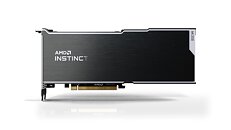TheLostSwede
News Editor
- Joined
- Nov 11, 2004
- Messages
- 17,597 (2.41/day)
- Location
- Sweden
| System Name | Overlord Mk MLI |
|---|---|
| Processor | AMD Ryzen 7 7800X3D |
| Motherboard | Gigabyte X670E Aorus Master |
| Cooling | Noctua NH-D15 SE with offsets |
| Memory | 32GB Team T-Create Expert DDR5 6000 MHz @ CL30-34-34-68 |
| Video Card(s) | Gainward GeForce RTX 4080 Phantom GS |
| Storage | 1TB Solidigm P44 Pro, 2 TB Corsair MP600 Pro, 2TB Kingston KC3000 |
| Display(s) | Acer XV272K LVbmiipruzx 4K@160Hz |
| Case | Fractal Design Torrent Compact |
| Audio Device(s) | Corsair Virtuoso SE |
| Power Supply | be quiet! Pure Power 12 M 850 W |
| Mouse | Logitech G502 Lightspeed |
| Keyboard | Corsair K70 Max |
| Software | Windows 10 Pro |
| Benchmark Scores | https://valid.x86.fr/yfsd9w |
Ansys announced that Ansys Mechanical is one of the first commercial finite element analysis (FEA) programs supporting AMD Instinct accelerators, the newest data center GPUs from AMD. The AMD Instinct accelerators are designed to provide exceptional performance for data centers and supercomputers to help solve the world's most complex problems. To support the AMD Instinct accelerators, Ansys developed APDL code in Ansys Mechanical to interface with AMD ROCm libraries on Linux, which will support performance and scaling on the AMD accelerators.
Ansys' latest collaboration with AMD resulted in a solution that, according to Ansys' tests, significantly speeds up simulation of large structural mechanical models—between three and six times faster for Ansys Mechanical applications using the sparse direct solver. Adding support for AMD Instinct accelerators in Ansys Mechanical gives customers greater flexibility in their choice of high-performance computing (HPC) hardware.

"Today's large, complex engineering challenges require quick, predictively accurate simulations that scale," said Brad McCredie, corporate vice president, Data Center and Accelerated Business Unit at AMD. "The collaboration between Ansys and AMD can enable a speed boost for some applications, enabling our joint customers to run complex structural simulations that drive higher quality, more efficient designs for cars, planes, and a range of other products while meeting their deadlines."
"Ansys' collaboration with AMD will help enable mutual customers to leverage cutting-edge GPU hardware for Ansys Mechanical applications in the data center, both on-premises and in the cloud to reduce time to market and deliver more optimal solutions," said Shane Emswiler, senior vice president of products at Ansys. "This work is well-aligned with our high-power computing strategy to invest deeply in GPUs as an emerging, sustainable, powerful technology for Ansys simulations."
View at TechPowerUp Main Site | Source
Ansys' latest collaboration with AMD resulted in a solution that, according to Ansys' tests, significantly speeds up simulation of large structural mechanical models—between three and six times faster for Ansys Mechanical applications using the sparse direct solver. Adding support for AMD Instinct accelerators in Ansys Mechanical gives customers greater flexibility in their choice of high-performance computing (HPC) hardware.

"Today's large, complex engineering challenges require quick, predictively accurate simulations that scale," said Brad McCredie, corporate vice president, Data Center and Accelerated Business Unit at AMD. "The collaboration between Ansys and AMD can enable a speed boost for some applications, enabling our joint customers to run complex structural simulations that drive higher quality, more efficient designs for cars, planes, and a range of other products while meeting their deadlines."
"Ansys' collaboration with AMD will help enable mutual customers to leverage cutting-edge GPU hardware for Ansys Mechanical applications in the data center, both on-premises and in the cloud to reduce time to market and deliver more optimal solutions," said Shane Emswiler, senior vice president of products at Ansys. "This work is well-aligned with our high-power computing strategy to invest deeply in GPUs as an emerging, sustainable, powerful technology for Ansys simulations."
View at TechPowerUp Main Site | Source



